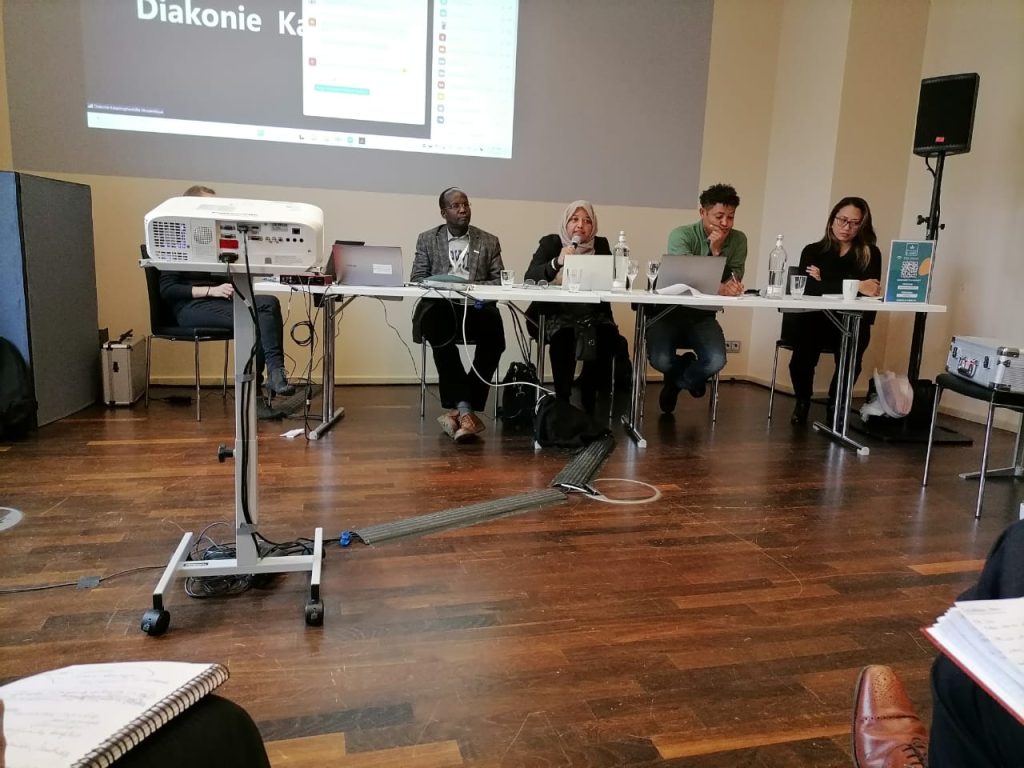4As team generated conversation at the Global Dialogue Platform
The Anticipation Hub’s 10th Global Dialogue Platform took place in Berlin and online from December 6 – 8, 2022.
The Academic Alliance for Anticipatory Action (4As) partners led a number of discussions on critical topics that have come out of their research and partnership.
Integrating anticipatory action and social protection: What role can humanitarians play?
In this session we shared insights on integrating anticipatory action and social protection in Bangladesh, Lesotho, Namibia, Somalia, Dominican Republic and the Philippines. Building on feasibility studies and research, we explored how this integration could be locally led, nationally owned and sustainable in the long term. Participants discussed what works and what doesn’t, and how a successful integration can be achieved.
4As team members involved: Selma Lendelvo (University of Namibia).

Partnerships and Climate Change Adaptation: Linking Stakeholders for Life-Saving Adaptation
Extreme events require investment from all stakeholders. In this interactive session, several members of the 4As team interrogated the role of partnerships. They led an interactive and solution oriented session that asked the questions: What roles do academics play in building anticipatory action evidence? Does the public sector risk landscape anticipate disasters? What is the effectiveness of humanitarian anticipatory action? We heard big ideas for using anticipatory action systems to build resilience to a changing climate and communicating about unprecedented events.
Some important points that were raised include:
- Lesotho is a great case study to illustrate the partnerships between academia, private sector, government, and humanitarian actors. We heard from representatives of all three sectors in this session.
- There is a need to integrate community voices in all planning and anticipatory action responses.
- Early warning systems are seen as low hanging fruit, but it’s not really that simple. We need the right infrastructure in place to be able to predict and model accurate simulations for future planning.
4As participants were: Erin Coughlan de Perez (Tufts), Leah B. Poole (Tufts), Makoala Marake (National University of Lesotho), Relebohile Mojaki (National University of Lesotho), Mahar Lagmay, and Mashfiqus Salehin (Bangladesh University of Engineering and Technology).

Whose Actions? Localizing the Anticipatory Action Agenda
Worldwide, local actors—government and civil society—are first to respond in crises and, depending on the effectiveness of their response, can save more lives and livelihoods than internationally-led efforts. The window for anticipatory actions is, by far, too limited to expect effective impacts if they are planned and executed solely by external actors. This recognition lay behind the 2016 Grand Bargain commitment to direct 25% of humanitarian funding to local level actors. Indeed, the Grand Bargain is still a mirage with less than 2% of global humanitarian funds going to local organizations and local actors continue to face several challenges. Local actors continue to function primarily as implementing partners, rather than as planners and decision makers as this goes to international, national, or regional levels. In the humanitarian arena their voices and expertise go mostly unnoticed or seemingly taken by their international spokesmen. In the session we examined different initiatives of locally-led processes across countries such as Mozambique, Uganda, Kenya, Philippines, and Mali to highlight how anticipatory actions can be grounded at the local levels and be led, in the long run, by actively engaged local actors.
4As team members: Luis Artur (Eduardo Mondlane University, Mozambique), Chris Garimoi Orach (Makerere University, Uganda), and Sonia Murshed (Bangladesh University of Engineering and Technology).

Anticipatory Action in and in the Aftermath of Conflict: Possibilities, Challenges, Ethical Considerations
Research shows that the most severe disaster events occur in many of the countries most affected by protracted conflict, while many people displaced by conflict end up in hazard-prone countries and regions. This highlights the pressing need to examine the possibilities, risks, and effectiveness of anticipatory action in these settings. This session explored anticipatory action during and in the aftermath of conflict. We looked at the challenges and opportunities for anticipatory action to be implemented in conflict settings and interventions for displaced people after they have fled conflict. We focused on particular considerations for refugees in countries where their rights, such as freedom of movement, are restricted, and how the humanitarian community must adapt interventions for these contexts.
Participants in this session took a deep interest in the question of forecasting conflict. There was a deep discussion about whether such forecasting should or should not be done, debating whether its harmful or if it would provide the opportunity to affected communities in innovative ways. The group agreed that it’s important to know that though we may not be able to predict conflict itself, we can predict and act before the impacts of conflict are felt.
4As involvement: Evan Easton-Calabria (Tufts University).


